Are you in search of the top help desk software available? You’ve landed in the right spot! From ticketing systems to knowledge bases to automation features, we will explore it all. Whether you’re a small business seeking a cost-effective solution or a large enterprise requiring advanced features, we have you covered.
As you know, Help desk software plays a significant role in managing customer inquiries, streamlining support processes, and ensuring customer satisfaction. Did you know that the help desk software market is growing super fast? It’s expected to reach a crazy $11 billion by 2025! And get this – 86% of service teams say they work way better with help desk systems. Teams that are growing fast use them a lot too, more than half of the time.
Let’s check out what the best help desk software is all about and see how it can change the way you give support.
What is Help Desk Software?
The help desk software offers an all-in-one workspace for managing and automating all activities regarding customer support.
It serves as a hub where customer inquiries, issues, and requests are managed from every channel: email, phone, chat, and social media.
Most of these systems generally comprise ticket management, knowledge base creation, automation tools, and reporting capabilities. Assistance desk software programs are designed to be the backbone of supporting customer support teams.
Organizing and setting priorities for customer issues, automating routine tasks, equipping agents with tools and information—the easier it is for a business to deliver faster, more accurate, and personalized support to customers.
Features of Help Desk software?
Ticketing System
One awesome place to keep track of all the questions and problems customers have is here! It’s like a super organized system that helps us help our customers faster and better.
Automated Workflows
Making things easier by having machines do the same thing over and over again to help with customer service.
Multi-Channel Support
Answering questions from customers through different ways like email, chat, phone, and social media.
Reporting and Analytics
Tools that help keep track of how well things are going and figure out what’s working best to make smarter choices.
Integration Capabilities
Being able to work well with other tools in the business, like keeping track of customers, managing projects, and talking with coworkers.
Suggested Read: Best Subscription Billing Software
Things to focus on while Selecting a Help Desk Software
Choosing the right help desk software for an organization is not an easy task. Some of the common macro-challenges a business comes across while choosing include:
1. Budget constraints
Balancing the desired features against the budgeted amount can be pretty challenging, especially in the case of small- to medium-scale businesses.
2. Overload of Features
Some solutions come overloaded with features; the major problem is deciding the ‘wanted’ from the ‘needed’ ones.
3. Integration problems
Ensuring that new help desk software seamlessly integrates as with previously installed systems and workflows is not a small task.
4. User Adoption
In case the support team is composed of people mostly resistant to change, resistance from these individuals will make it hard for new software to be implemented successfully.
5. Scalability
One key consideration in this selection will be for a solution that scales with your business without the need to undertake a complete overhaul at some point in the future.
6. Data security and compliance
Ensure that the software complies with stringent industry-specific safety standards and compliance requirements for businesses dealing with sensitive customer information.
15 Best Help Desk Software for 2024
1. Help Scout
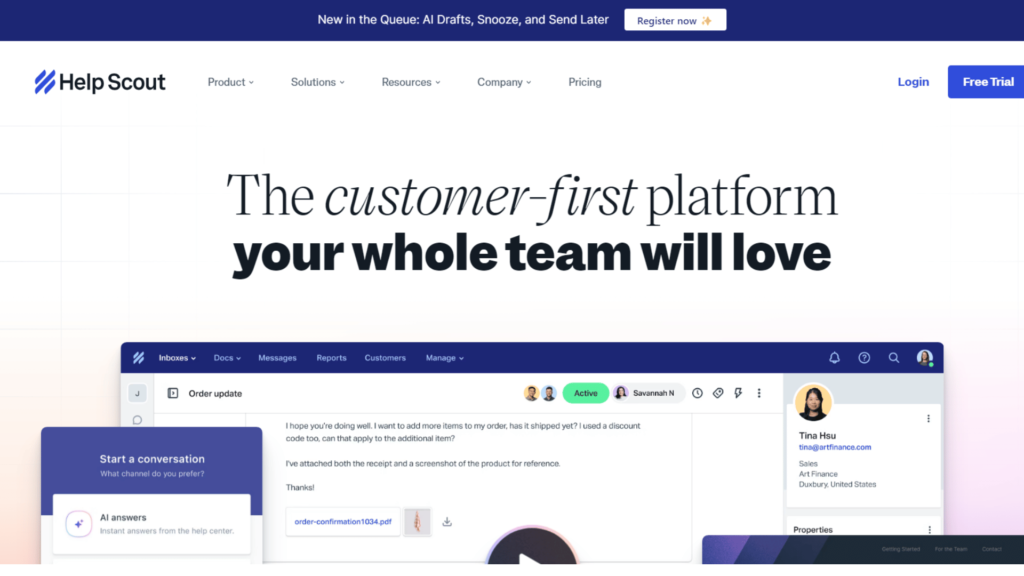
Help Scout is an easy-to-use help desk solution, highly intuitive and easy for customer support operations. It features a very clean, email-inbox-like interface that makes team collaboration incredibly frictionless in managing customer inquiries.
What makes Help Scout special is that it enables one to create customized customer experiences, guaranteeing that one’s business has a human feel in all support interactions.
It integrates seamlessly with various third-party tools and has excellent reporting features to help teams track their performance and work out where improvements are necessary.
Key Features:
1. Shared inbox for team collaboration
2. Knowledge base creation and management
3. Custom workflow and automation
4. Next-generation reporting and analytics
Pros:
1. User-friendly interface
2. Excellent support for customers
3. Native integrations with famous tools
Cons:
1. Not highly customizable
2. Pretty expensive for small teams
3. Advanced features only on higher-tier plans
Website: https://www.helpscout.com/
2. Hiver
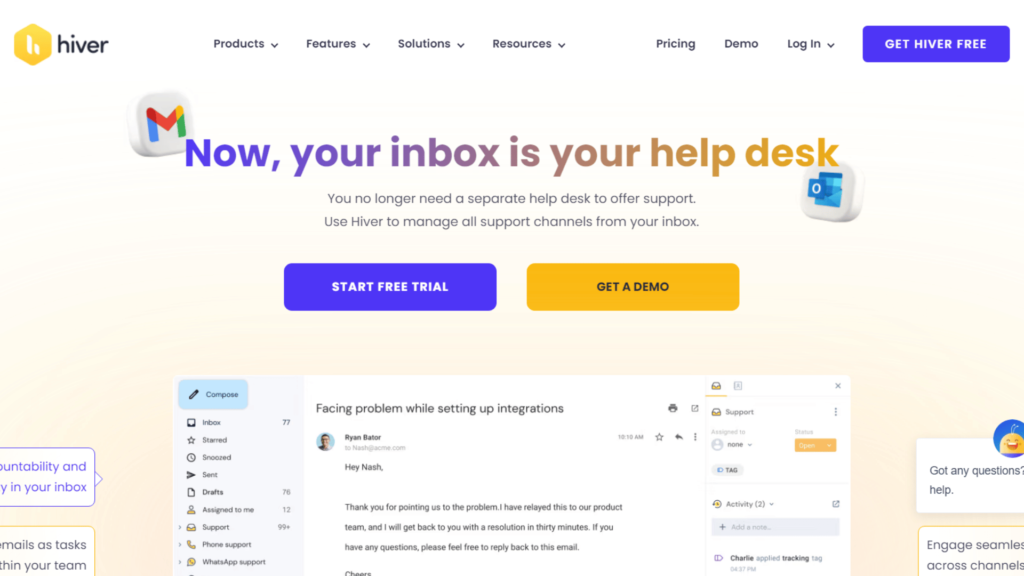
Hiver is a Gmail-based solution for help desk operations, which can turn your Google Workspace into a powerful customer support tool—shared inboxes, assignments, and collaboration on customer inquiries, all from the familiar Gmail interface.
Hiver is fitting for small to midsize companies already running a Google Workspace and looking for customer support capabilities without having to adopt a whole new system.
It includes templates, analytics, and automation that power the enhancement required to deal with better team productivity and response times.
Key Features:
1. Shared Native inbox management in Gmail
3. Email templates and automation
4. Real-time analytics and reporting
Pros:
1. Native integration with Gmail
2. Minimum learning required for Gmail users
3. Reasonable pricing for small teams
Cons:
1. Not much functionality outside of Gmail
2. It misses out on some advanced features of most standalone help desks
3. Not good enough for very large teams
Website: https://hiverhq.com/
3. Zendesk
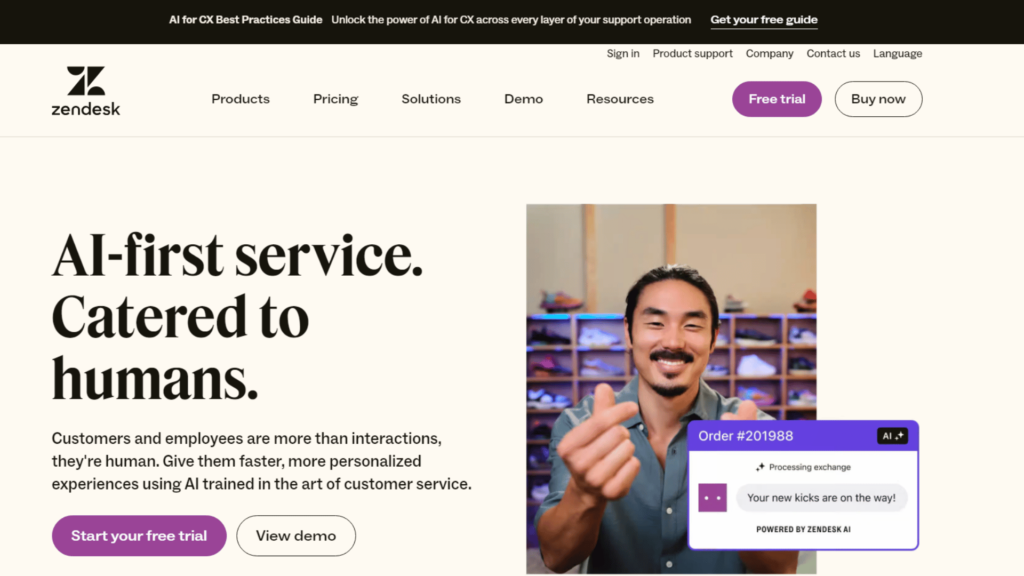
It’s a fully integrated customer service platform,ráv boilerplate with all sorts of tools for running customer interactions across multiple channels. It provides one place for managing tickets, live chat, phone support, and social media inquiries.
Zendesk is incredibly feature-rich, with nice customization options, making it suitable for any size of business—from small startups to big companies.
The platform has good integration capabilities; hence, businesses can easily link their help desk with CRM systems, every e-commerce platform, and other core tools.
Key Features:
1. Omnichannel ticket management
2. AI answer bot
3. Customizable workflows and automation
4. Robust reporting and analytics suite
Pros:
1. Robust feature set
2. Solid scalability options for growing businesses
3. Big marketplace of integrations and apps
Cons:
1. Complex setup and configuration
2. Higher pricing tiers for advanced features
3. Several users pointed out a steep learning curve
Website: https://www.zendesk.com/
4. Front

Front is a collaborative customer communication platform that brings together the capabilities of a help desk and the easiness of an email client. One can manage emails, SMS, social media, and many more in just one inbox.
Why is Front special? Its way of customer support takes into account teamwork: private comments, and shared drafts.
It becomes really useful for businesses that rely on high personalization in customer support and want to keep an absolute environment within the team of agents to handle inquiries.
Key Features:
1. Unified inbox across multiple channels of communication
2. Team collaboration tools together with internal comments
3. Automated workflows and rules
4. Integration with CRM Software tools
Pros:
1. Intuitive, email-like interface
2. Good team collaboration features
3. Customizable workflows and integrations
Cons:
1. Can get quite expensive for larger teams
2. Limited built-in reporting capabilities
3. Lacking some advanced help desk features
Website: https://front.com/
5. Gorgias
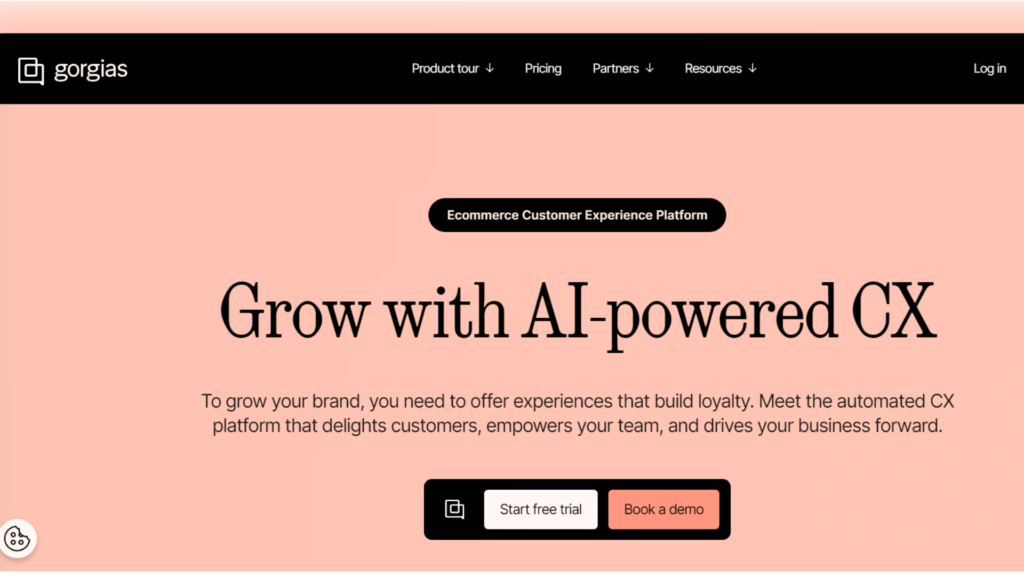
Gorgias is a help desk solution designed especially for e-commerce businesses. It fully integrates with Shopify, Magento, and BigCommerce, and therefore grants access to customers’ orders and information inside the help desk.
Gorgias offers functionality tailor-made for online stores: Order management Custom views for different support scenarios Automated responses based on order status.
It’s an excellent platform for e-commerce since it’s tailored to meet online retailers’ customer support operational needs.
Key Features:
1. Deep eCommerce integration
2. Order management inside the help desk
3. Customizable macros and automation
4. Social media management tools
Pros:
1. Tailored for eCommerce businesses
2. Easy access to order and customer data
3. Intuitive interface with customizable views
Cons:
1. Not much functionality for non-eCommerce businesses
2. Can get pricey for small shops
3. Some customers have reported occasional performance issues.
Website: https://www.gorgias.com/
6. Kustomer
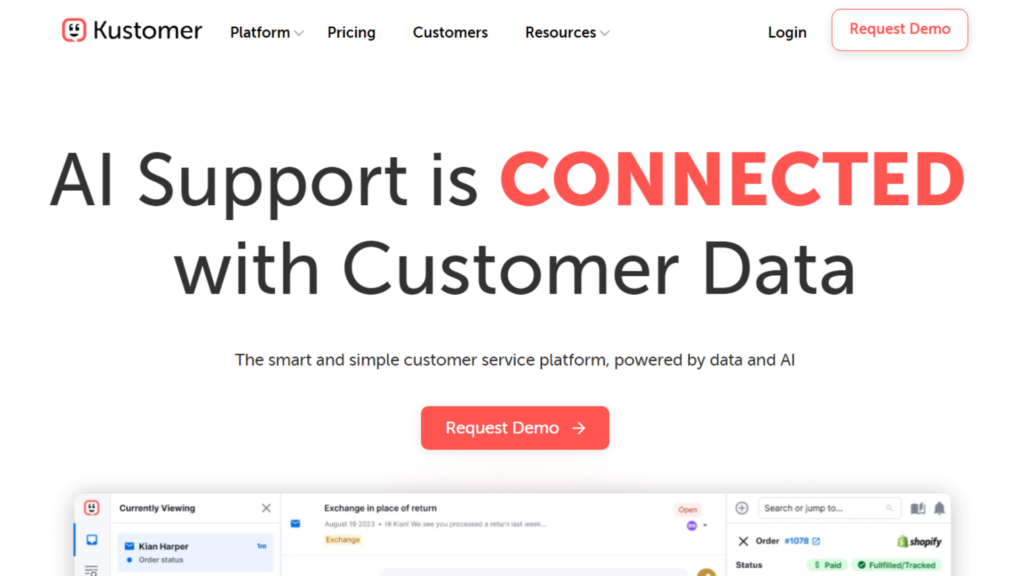
Kustomer is a customer service CRM systems that comes with a different paradigm to the help desk. It delivers a 360-degree view of the customer by integrating data from various sources into one timeline.
It will give the complete knowledge to support agents about each customer’s history and preferences. Kustomer’s AI-driven features—such as automatic routing and suggested responses—improve efficiency and response time.
It is an appropriate platform for companies that aim to provide personalized customer experiences and who want to integrate all customer data in one place from the various touchpoints.
Key Features:
1. Single customer timeline and history
2. AI-driven Automation and Routing
3. Omnichannel Support Management
4. Custom Workflows and Business Process Automation
Pros:
1. A complete view of customers in one platform
2. Very strong AI and automation capabilities
3. Flexible for customization
Cons:
1. Long setup and configuration time
2. Costlier than some of the other options
3. Requires a lot of onboarding time
Website: https://www.kustomer.com/
7. Google Collaborative Inbox
Google Collaborative Inbox is a free tool inside Google Workspace for teams to manage their shared email addresses collaboratively. It isn’t a real help desk by any stretch of the imagination, but it does bring the basic functionality that small teams or simple support needs inside of organizations, would want.
They can delegate conversations to team members, add labels, and get updates on the status of inquiries. Google Collaborative Inbox builds up the same familiarity that is known through the Gmail interface, hence it does not come with much stress to adopt if the teams ever used Google Workspace.
It is highly expensive; hence, it will be perfect for a small business or when searching for a zero-cost solution for shared inbox management.
Key Features:
1. Shared inbox management within Gmail
2. Task Assignment and tracking
3. Labeling and categorization of emails
4. Can be integrated with other Google Workspace apps
Pros:
1. Free for any Google Workspace user
2. Similar UI to Gmail
3. Setting it up and using it is pretty easy
Cons:
1. Not as fully featured as purely help-desk solutions
2. No advanced automation or reporting
3. Won’t scale that well for larger support teams
Website: https://workspace.google.com/products/gmail/
8. Freshdesk
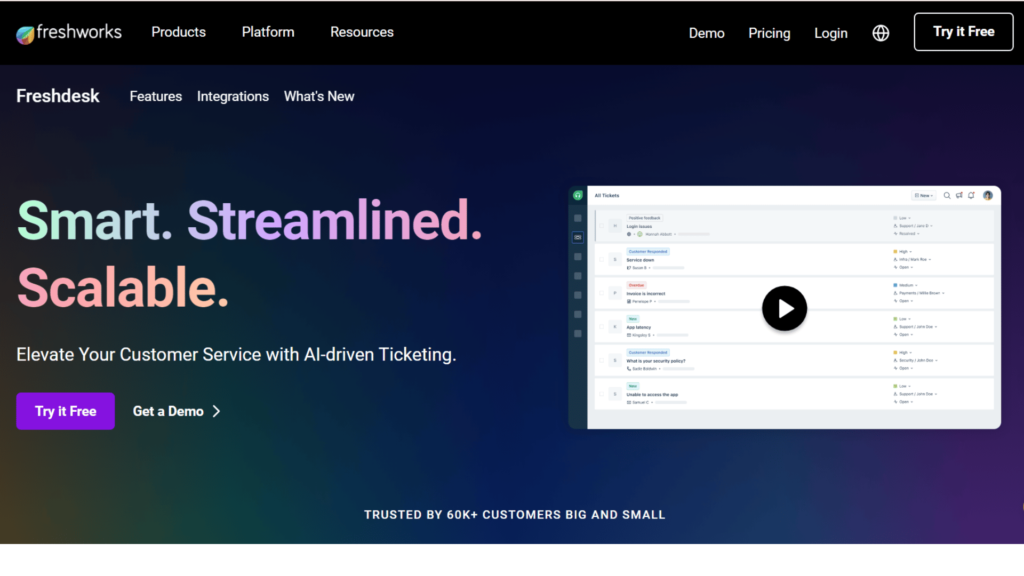
Freshdesk is an all-powerful omnichannel customer support software based in the cloud, targeting businesses of any size. It provides all-round packaging for the management of customer interactions across e-mail, phone, chat, and even social media.
Freshdesk is also easy to use and leveled with automation-driven capabilities that make it simple for teams to smooth out their support processes to drive greater efficiency. The system also offers a very strong knowledge base solution whereby businesses can create self-service portals for their customers.
It has scalable pricing plans and a lot of integration options, making it an ideal solution for any growing business looking to have flexibility within its help desk.
Key Features:
1. Ticket management across multiple channels
2. Automation and AI-powered support
3. Knowledge base and community forums
4. Fully customizable dashboards and reporting
Pros:
1. The user interface is user-friendly and intuitive.
2. It comes with a pretty all-encompassing set of features.
3. There are tiered pricing plans available for companies of different sizes.
Cons:
1. More complex features are only available in higher tiers.
2. It might prove overwhelming for very small teams.
3. It has less functionality on the mobile app.
Website: https://freshdesk.com/
9. Zoho Desk

Zoho Desk is a part of the suite of business applications under Zoho and provides a robust help desk solution for any business size. It creates a context-aware help desk setting customer information, interaction history, and other relevant data at the top so that agents can provide more personalized support.
Zoho Desk offers reliable automation capabilities with AI-driven features, which include Zia, an AI assistant, for the betterment of ticket prioritization and suggesting responses.
It is also well-suited for businesses that already have invested in other products by Zoho or are looking to have an all-in-one business software ecosystem through third-party applications.
Key Features:
1. Contextual ticketing system
2. AI-driven assistant—Zia—for ticket management
3. Customizable self-service help center and knowledge base
4. Advanced workflow automation
Pros:
1. Excellent integration with the Zoho environment
2. Advanced methods of automation and AI capabilities
3. Competitive pricing against feature set
Cons:
1. Page layout sometimes can get messy and cluttered
2. One needs a little practice to learn advanced features
3. Occasional performance issues are reported by some users
Website: https://www.zoho.com/desk/
10. SysAid
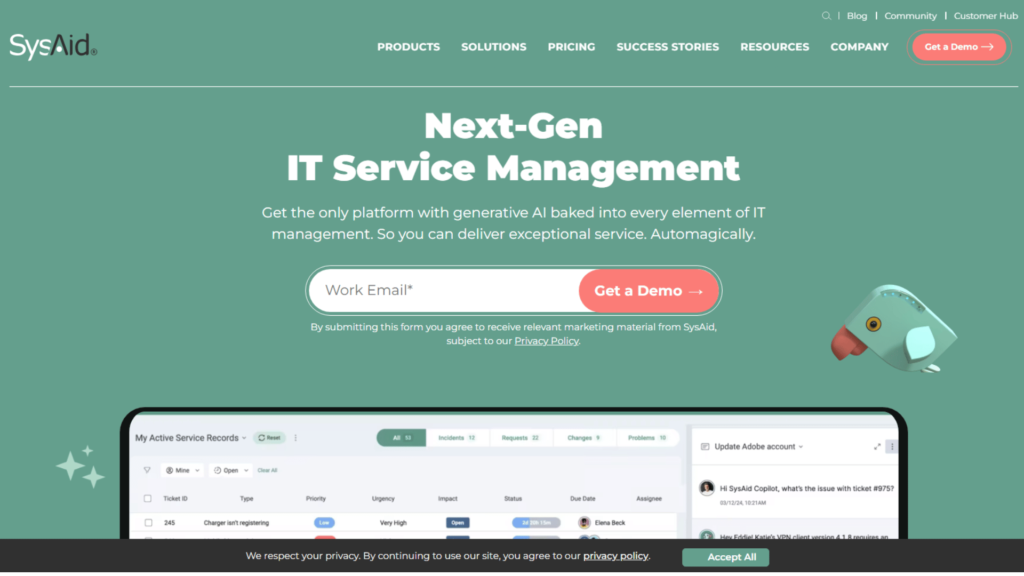
SysAid is a platform for IT service management that hosts robust help desk functionality to manage, suitably, IT support tickets, assets, and services either in foreign or any other local organization. It handles tickets, offers a self-service portal and knowledge base, and automation purposes.
The solution targets IT departments and managed service providers in search of a help desk that will work in conjunction with greater tools for IT management. Because it is flexible and has an option for customization, SysAid can adjust to organizations in different scenarios of IT support and workflows.
Key Features:
1. IT ticket management and tracking
2. Asset management and inventory tracking
3. CMDB — Configuration Management Database
4. Customizable workflows and automation
Pros:
1. Deep ITSM functionality
2. Robust asset management features
3. Very customizable for specific requirements
Cons:
1. Can be overkill for non-IT-focused teams
2. The user interface can appear dated to some
3. The cost is higher than pure help desk offerings
Web: https://www.sysaid.com/
11. Jira Service Management
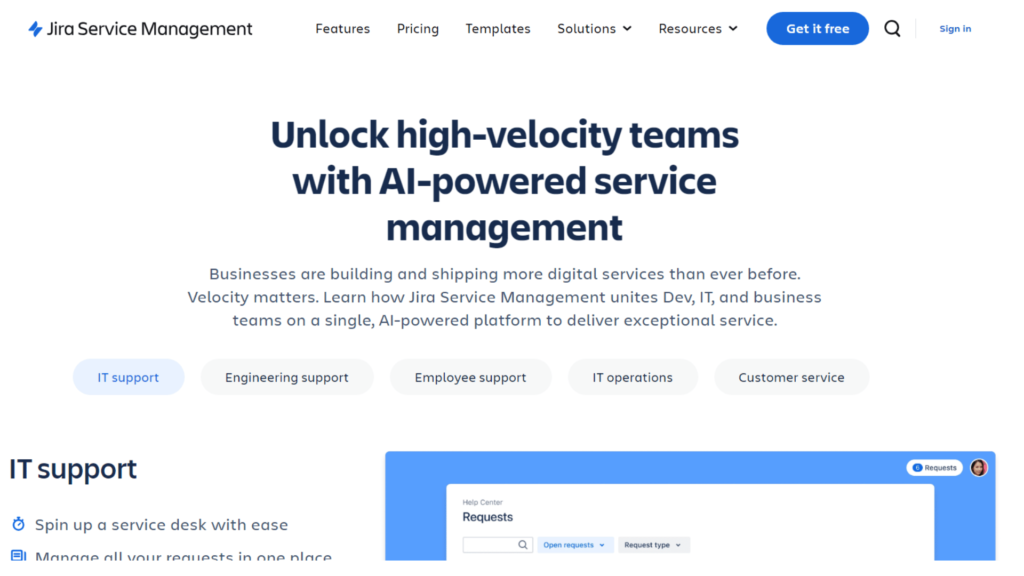
Atlassian’s answer to IT service management and customer support is the solution known as Jira Service Management. It brings robust ticketing capabilities to the table but also accommodates workflow customization and tight integration with other Atlassian products.
It flexes serious muscle in change management, incident management, and problem management processes. Due to its flexibility, it is applied in numerous teams other than IT, like HR and facilities management.
Its powerful API and huge marketplace of add-ons further allow extensive customization and a high degree of functionality extension.
Key Features:
1. Branded service desk portal
2. Sophisticated workflow motor
3. Knowledge base—built-in
4. Robust reporting and SLA tracking
Pros:
1. Tight integration with the Atlassian ecosystem,
2. Highly customizable workflows,
3. Strong for IT service management
Cons:
1. Challenging to set up and administer
2. Overkill for simple help desk needs
3. High-priced for larger teams
Website: https://www.atlassian.com/software/jira/service-management
12. Spiceworks Cloud Help Desk

Spiceworks Cloud Help Desk is a free and cloud-based solution designed for IT professionals and small to medium-sized businesses. It provides the most basic ticketing features, encompassing the creation, assignment, and tracking of tickets.
This platform is also equipped with a knowledge base and reporting features. While it’s arguable that less is brought to the table with Spiceworks Cloud Help Desk compared to paid solutions, it nonetheless provides a sound basis for teams to organize their support process without the associated costs of their being brought on.
It has an ad-supported business model that enables it to be free to users.
Key Features:
1. Ticket management and tracking
2. User portal for ticket submission
3. Basic reporting and analytics
4. Knowledge base functionality
Pros:
1. Completely free to use
2. Very easy to set up, even easier to use
3. Integrates with other Spiceworks IT tools
Cons:
1. Ad-supported model
2. Not very flexible in terms of customization
3. Fewer features than paid solutions offer
Site: https://www.spiceworks.com/free-help-desk-software/
13. SolarWinds Service Desk
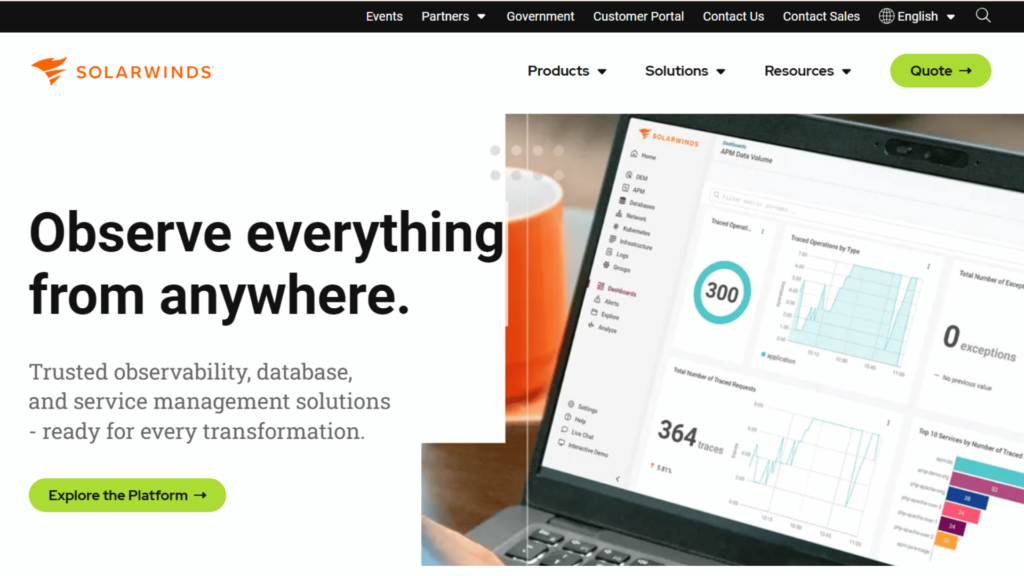
SolarWinds Service Desk is an IT service management solution where the help desk is combined with IT asset management and service management functionality. It makes the full range of tools available for IT support management, such as incident, problem, and change management processes.
The user-friendly interface and the automation capabilities of the platform smooth IT operations and raise service delivery. SolarWinds Service Desk is appropriate for medium to large enterprises that need comprehensive ITSM functionality with a strong help desk feature set.
Key Features:
1. Incident and problem management
2. IT asset management and discovery
3. Change management and release management
4. Customizable dashboards and reporting
Pros:
1. Comprehensive all-rounded ITSM functionality
2. Strong asset management
3. User-friendly interface
Cons:
1. Expensive for small teams
2. Steep learning curve as expressed by many users
3. The mobile app almost restricts functionality
Website: https://www.solarwinds.com/
14. ManageEngine ServiceDesk Plus

ManageEngine ServiceDesk Plus is an end-to-end IT service management ITSM solution with enhanced help desk functionality. It puts forward all features needed to manage IT support, assets, and services.
The tools presented for this platform include incident management, problem management, change management, and asset management. ServiceDesk Plus is a reputed name when it involves flexibility and the possibility of customization to suit different scenarios concerning IT support and workflows.
That would make it perfectly adapted for medium to large enterprises in search of a feature-rich end-to-end ITSM solution, also containing a strong help desk.
Key Features:
1. Integrated IT asset management
2. ITIL aligned processes
3. Customizable workflows and automation
4. Self-service portal and knowledge base
Pros:
1. Comprehensive ITSM functionality
2. Highly customizable to suit specific needs
3. Robust reporting and analytics capabilities
Cons:
1. Difficult to set up, configure
2. UI can be cluttered for some users
3. On-premise version requires being maintained by IT resources
Website: https://www.manageengine.com/products/service-desk/
15. Freshservice

Freshservice is an ITSM solution purpose-built for IT teams and internal support from the makers of Freshdesk. It provides a fresh, intuitive interface and a very rich set of features to manage IT services, assets, and support requests.
Freshservice is designed to meet the best practices of ITIL and includes modules for incident management, problem management, change management, and asset management. AI-driven features bring efficiency and reduce resolution time by auto-classifying tickets and suggesting solutions.
Freshservice is the platform that facilitates companies of any size to have a friendly user experience-based Information Technology Service Management with a robust help desk.
Key Features:
1. ITIL-aligned service management processes
2. IT asset discovery and management
3. AI-powered ticket routing and suggestions
4. Customizable self-service portal and knowledge base
Pros:
1. User-friendly interface
2. Deep automation capabilities
3. Robust ITSM functionality
Cons:
1. More complex features only exist in upper pricing tiers
2. Higher price for bigger teams
3. Fewer options for customization than some of the other entrants on this list
Website: https://freshservice.com/
Conclusion
This is an overview of the top 15 help desk software for 2024, featuring all their main features and the strengths and weaknesses of each. All of the solutions have unique strengths, so some are better according to business needs and size. The size of your team, budget, features that will be required, and integration needs could give a better understanding of where they will fit within your organization.
FAQs
What could be the best free help desk software?
There exist popular free solutions—Google Collaborative Inbox and Spiceworks Cloud Help Desk—for simple help desk needs.
Which help desk software is best for e-commerce businesses?
Gorgias is designed explicitly for purposes related to e-commerce and has good integration with Shopify, Magento, and other similar platforms.
What could be the easiest help desk software for small teams?
Both Help Scout and Freshdesk have won great praise for their intuitive interface and general ease of use for small teams.
Which help desk software has the most extensive ITSM capabilities?
Jira Service Management, SolarWinds Service Desk, and ManageEngine ServiceDesk Plus are all ITSM-oriented functionality coupled with help desk functions.



